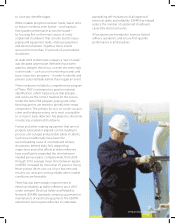Valero 2010 Annual Report Download - page 17
Download and view the complete annual report
Please find page 17 of the 2010 Valero annual report below. You can navigate through the pages in the report by either clicking on the pages listed below, or by using the keyword search tool below to find specific information within the annual report.
15RENEWABLES
high commodity prices and negative margins. The
company has since beneted from a market recovery
and increases in government mandates for additional
corn ethanol capacity under the federal Renewable
Fuel Standard, requiring up to 15 billion gallons per
year to be blended with gasoline by 2015. Valero’s
annual production represents 8.6 percent of U.S.
ethanol production, fueling more than 20 million cars.
Ethanol blended with gasoline results in a
cleaner-burning product. It is a high-octane renewable
fuel produced by fermenting processed corn starch
with yeast. Each Renewables plant processes as much
as 43 million bushels of corn into 110 million to
120 million gallons of ethanol each year. Valero’s
10 plants produced an average of 3.25 million gallons
of ethanol per day in fourth-quarter 2010. Valero buys
corn directly from hundreds of local farmers and
dozens of commercial elevators, and receives it by
truck or rail. On our Web site, we post daily corn bids
for local farmers and cooperative leaders to use in
conducting transactions.
In addition, the product that is left after the ethanol is
produced is a valuable livestock feed called distillers
grains. Distillers grains are high in protein, fat, vitamins
and minerals, making it an excellent feed supplement
for beef and dairy cattle, swine and poultry. Each plant
annually produces up to 390,000 tons of distillers
grains – enough to feed as many as 250,000 head of
cattle. The distillers grains we sell replace about one
half of the corn we buy from the grains market.
The entire kernel of corn is processed, with one bushel
of corn yielding approximately 2.8 gallons of ethanol
and 17 pounds of distillers grains. There are no waste
products generated from the corn processed.
The ethanol is stored on-site and then shipped mostly
by rail in 75- to 100-car trains to large customers –
primarily reners and gasoline blenders – in markets
such as New York, Chicago, Dallas, Florida and the West
Coast. Valero also uses ethanol for its own needs, in
blending gasoline. We typically have several miles of
railway track on-site to handle the rail cars we use.
Distillers grains are shipped by truck and rail, and
occasionally by barge, primarily to animal-feed
customers locally and across the U.S., Canada and
Mexico. Valero also sends some distillers grains by
bulk-container ships to Asian markets.
Our plants are located on up to 420 acres, and employ
as many as 70 full-time personnel each. Using local
economy multipliers, each location supports an
estimated 300 to 400 area jobs, beneting farmers,
truck drivers, railroads, agricultural equipment
and chemical dealers and others. Plant employees
additionally support their local communities, pledging
more than $175,000 to United Way for 2011 and
logging thousands of volunteer hours.
Valero is also active in wind electrical power, under
its Sunray Wind subsidiary, and investments in new
bio-fuels processes. We operate a 50-megawatt wind
farm with 33 turbines in the Texas Panhandle that
produces electricity for our adjacent McKee Renery
and a local utility. Valero has investments in emerging
technologies that would produce fuel from animal-fat,
grease and used cooking oil; plant materials and wood;
algae; and municipal-landll solid waste.
From corn ethanol to wind power to bio-fuels, Valero
is positioned for the next generation of energy
production.
























